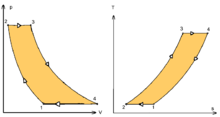Olsen cycle

The Olsen cycle is a pyroelectric cycle, which was developed between 1978 and 1986 by Olsen and Bruno,[1] by Olsen and Brown,[2] Olsen and Evans,[3] as well as by Olsen et al.[4] It has been called the Ericsson cycle. However, the Olsen cycle avoids the least confusion with its analogous process of the Ericsson cycle.[5] The Olsen cycle can generate electricity directly from heat when applied to a pyroelectric material,[6] and has been the most favorable method for the generation of electricity from heat using pyroelectric energy harvesting.[7] It consists of two isothermal and two isoelectric field processes in the displacement versus electric field diagram.[8]
It can be compared to the Ericsson cycle, where working fluid undergoes two isothermal and two isobaric processes in a pressure-volume diagram.[9][10] However, the Ericsson cycle does not include the hysteresis loop, which is essentially a lag between the input of an electric field and the material's output.
References
[edit]- ^ Olsen, R. B. and Bruno, D. A., Pyroelectric Conversion Materials, in Proceedings of 21st Intersociety Energy Conversion Engineering Conference, American Chemical Society, San Diego, pp. 89–93, Aug. 25–29, 1986.
- ^ Olsen, R. B. and Brown, D. D., High-Efficiency Direct Conversion of Heat to Electrical Energy—Related Pyroelectric Measurements, Ferroelectrics, vol. 40, pp. 17–27, 1982.
- ^ Olsen, R. B. and Evans, D., Pyroelectric Energy Conversion: Hysteresis Loss and Temperature Sensitivity of a Ferroelectric Material, J. Appl. Phys., vol. 54, pp. 5941–5944, 1983.
- ^ Olsen, R. B., Bruno, D. A., and Briscoe, J. M., Cascaded Pyroelectric Energy Converter, Ferroelectrics, vol. 59, pp. 205–219, 1984.
- ^ CHAPTER 7, PYROELECTRIC ENERGY CONVERSION, Laurent Pilon. & Ian M. McKinley, Mechanical and Aerospace Engineering Department, Henry Samueli School of Engineering and Applied Science, University of California, Los Angeles, CA
- ^ Olsen, Randall; Briscoe, Joseph; Bruno, David; Butler, William (2011-02-07). "A pyroelectric energy converter which employs regeneration". Ferroelectrics. 38 (1): 975–978. doi:10.1080/00150198108209595.
- ^ Thakre, Atul; Kuma, Ajeet; Song, Hyun-Cheol; Jeong, Dae-Yong; Ryu, Jungho (2019-05-10). "Pyroelectric Energy Conversion and Its Applications—Flexible Energy Harvesters and Sensors". Sensors. 19 (9): 2170. doi:10.3390/s19092170. PMC 6539396. PMID 31083331.
- ^ Lee, Felix Y.; Ashcon, Navid; Pilon, Laurent (2012). "Pyroelectric waste heat energy harvesting using heat conduction, Applied Thermal Engineering". Applied Thermal Engineering. 37: 30–37. doi:10.1016/j.applthermaleng.2011.12.034. ISSN 1359-4311. S2CID 12022162.
- ^ McKinley, Razmig Kandilian, Laurent Pilon, Ian; Kandilian, Razmig; Pilon, Laurent (2012). "WASTE HEAT ENERGY HARVESTING USING OLSEN CYCLE ON 0.945 PB(ZN1/3NB2/3)O3 −0.055 PBTIO3 SINGLE CRYSTALS" (PDF). Smart Materials and Structures. 11 (3).
{{cite journal}}: CS1 maint: multiple names: authors list (link) - ^ Moran; Shapiro (2014). Fundamentals of Engineering Thermodynamics (5 ed.). John Wiley and Sons.
